The 2020 Mac Mini Unleashed: Putting Apple Silicon M1 To The Test
by Andrei Frumusanu on November 17, 2020 9:00 AM ESTBenchmarks: Whatever Is Available
As we’ve had very little time with the Mac mini, and the fact that this not only is a macOS system, but a new Arm64-based macOS system, our usual benchmark choices that we tend to use aren’t really available to us. We’ve made due with a assortment of available tests at the time of the launch to give us a rough idea of the performance:
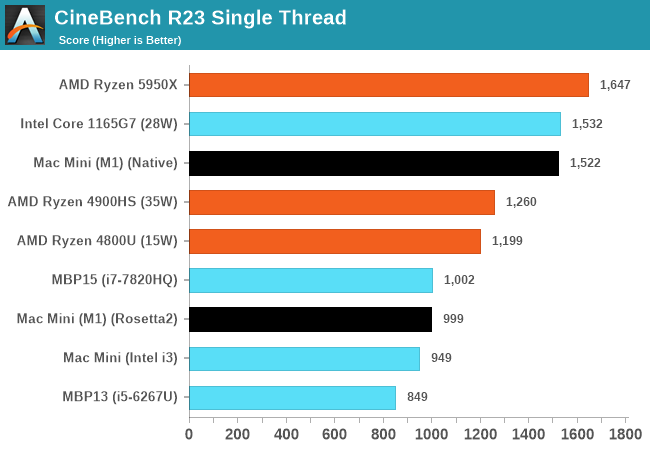
One particular benchmark that sees the first light of day on macOS as well as Apple Silicon is Cinebench. In this first-time view of the popular Cinema4D based benchmark, we see the Apple M1 toe-to-toe with the best-performing x86 CPUs on the market, vastly outperforming past Apple iterations of Intel silicon. The M1 here loses out to Zen3 and Tiger Lake CPUs, which still seem to have an advantage, although we’re not sure of the microarchitectural characteristics of the new benchmark.
What’s notable is the performance of the Rosetta2 run of the benchmark when in x86 mode, which is not only able to keep up with past Mac iterations but still also beat them.
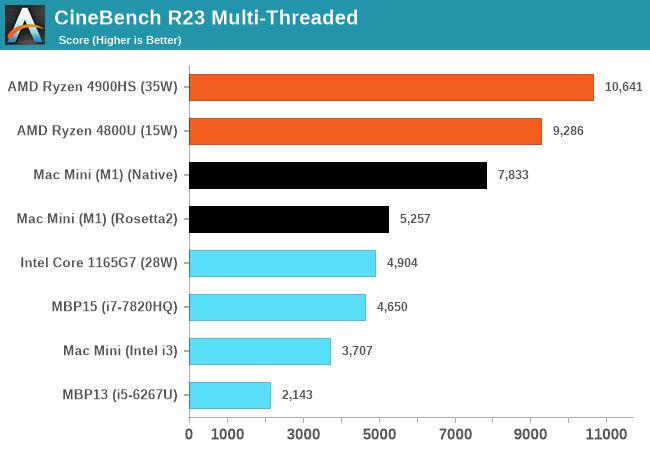
In the multi-threaded R23 runs, the M1 absolutely dominates past Macs with similar low-power CPUs. Just as of note, we’re trying to gather more data on other systems as we have access to them, and expand the graph in further updates of the article past publishing.
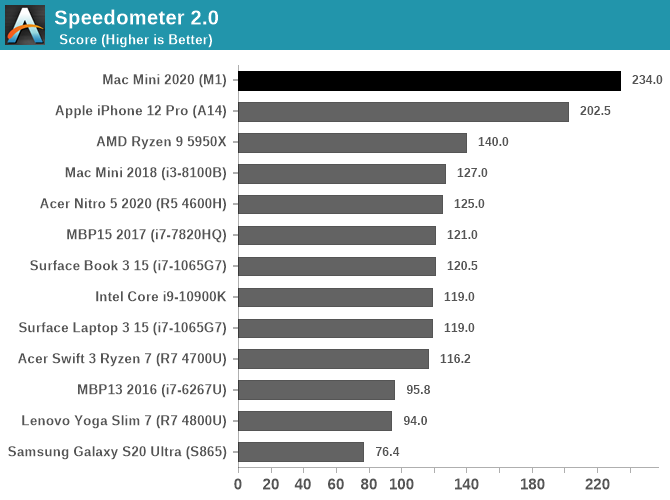
In browser-benchmarks we’ve known Apple’s CPUs to very much dominate across the landscape, but there were doubts as to whether this was due to the CPUs themselves in the iPhone or rather just the browsers and browser engines. Now running on macOS and desktop Safari, being able to compare data to other Intel Mac systems, we can come to the conclusion that the performance advantage is due to Apple’s CPU designs.
Web-browsing performance seems to be an extremely high priority for Apple’s CPU, and this makes sense as it’s the killer workload for mobile SoCs and the workload that one uses the most in everyday life.
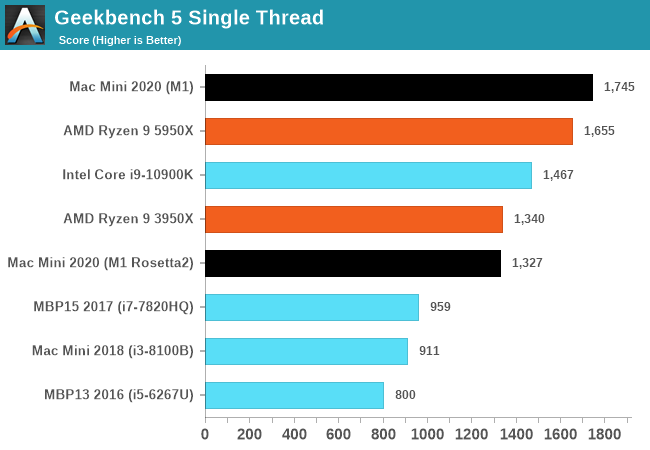
In Geekbench 5, the M1 does again extremely well as it actually takes the lead in our performance figures. Even when running in x86 compatibility mode, the M1 is able to match the top single-threaded performance of last generation’s high-end CPUs, and vastly exceed that of past iterations of the Mac mini and past Macbooks.
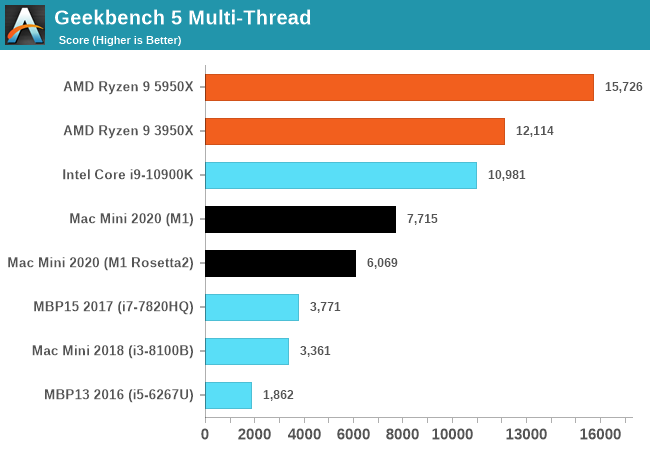
Multi-threaded performance is a matter of core-count and power efficiency of a design. The M1 here demolishes a 2017 15-inch Macbook Pro with an Intel i7-7820HQ with 4 cores and 8 threads, posting over double the score. We’ll be adding more data-points as we collect them.


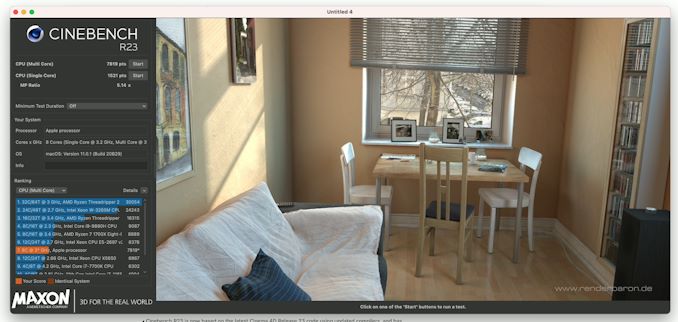








682 Comments
View All Comments
GeoffreyA - Thursday, December 3, 2020 - link
Sad, but true. I remember his "Road Ahead" article in 2014 and that was it. Gone. Well, let's hope the man leaves Apple someday and comes back home to Anandtech. I know, the chances of that happening are exceedingly slim.pjc15 - Saturday, November 21, 2020 - link
This might be evidence that ARM is the way of the future, but Intel, AMD, and Microsoft are too entrenched in x86 to do anything about it. They would have to maintain x86 and ARM versions of everything, and on the hardware side especially, they don't seem to have the bandwidth to do that. Maybe custom servers will move to ARM, maybe some types of pros will move to macOS if Apple's lead extends, but for the vast majority of cases, x86 is good enough and cheap enough that Wintel will be unaffected. In order to upend the industry, Apple would have to sell its chips to OEMs, or sell sub-$500 computers, both of which have almost no chance of happening.profquatermass - Sunday, November 22, 2020 - link
So where does the M1 go from here?How can they make the M2?
Spunjji - Monday, November 23, 2020 - link
The next move will probably be a larger variant with more (8?) large cores, more (+50%?) GPU resources, a wider (256bit?) memory bus, and LPDDR5. They're all fairly obvious ways to provide higher performance, but they mean a larger die, which means lower yields on a 5nm process that's still in its early stages.utferris - Wednesday, November 25, 2020 - link
I hope there will be Apple ISA. ARM ISA can be limiting at some point if apple want to have their own custom instructions for better performance.And NVidia will be owning ARM, which is the worst thing to Apple and the world.
Focher - Thursday, November 26, 2020 - link
Nvidia owning ARM will have zero impact on Apple.tokale - Friday, November 27, 2020 - link
This is the biggest misconception out there, some folks think Apple's chip fate it tied to ARM. Truth is the only thing ARM related to Apple's chips is the instruction set, everything else's is Apple's.PickUrPoison - Saturday, December 12, 2020 - link
True. But OP is right about instruction set extensions. Do we know there aren’t any? I expected some for perhaps the purpose of Rosetta2 performance acceleration, esp for the on the fly emulation vs. Rosetta2 translation.helpmeoutnow - Thursday, November 26, 2020 - link
looks like another bubble from Apple. but they will sell it as something amazing.PickUrPoison - Saturday, December 12, 2020 - link
Yes, congratulations to Apple, absolutely! As Andrei said, “overall, Apple hit it out of the park with the M1”.